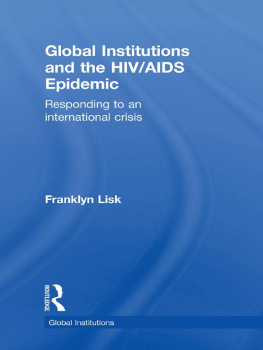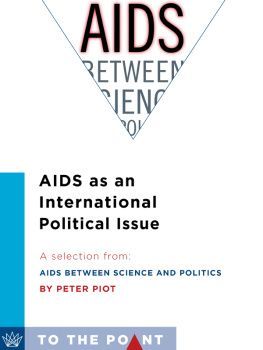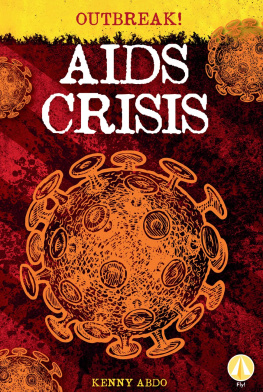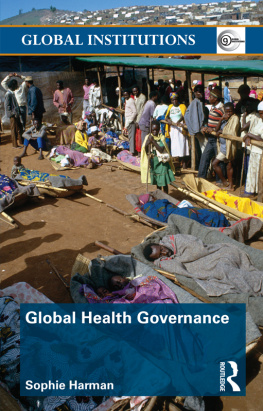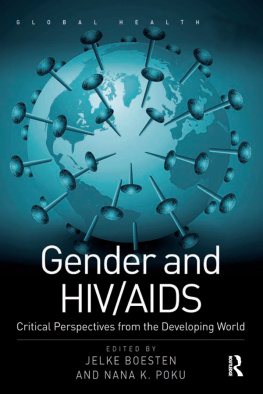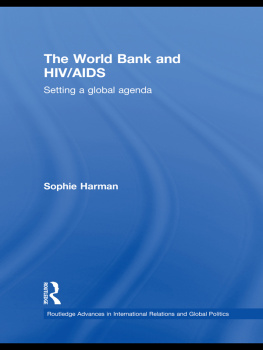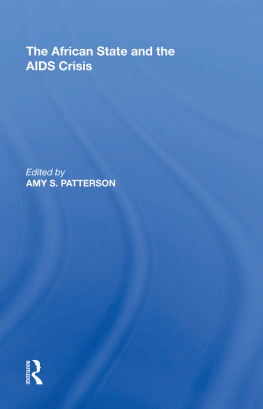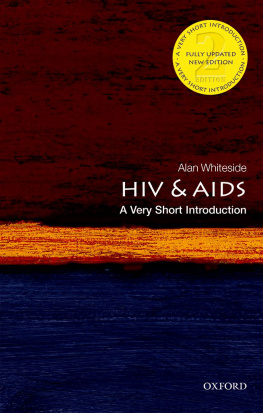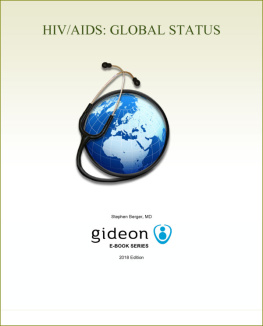Global Institutions and the HIV/AIDS Epidemic
Written by a leading expert in the field, this book provides a clear and incisive analysis of the different perspectives of the global response to HIV/AIDS, and the role of the different global institutions involved. The text highlights HIV/AIDS as an exceptional global epidemic in terms of the severity of its impact as a humanitarian tragedy of unprecedented proportion, its multidimensional characteristics, and its continuous evolution over more than two decades.
The careful analysis in this volume critically reviews key issues in the global response, including:
- HIV/AIDS as a development challenge;
- NorthSouth power relationships and tensions;
- international and regional partnerships between donor governments and recipient countries;
- governance of global institutions and impact on the capacity of developing countries to respond effectively to the epidemic;
- prevention versus treatment as options in HIV/AIDS services;
- how to make the money work in support of effective AIDS financing.
Providing a comprehensive but easy to read and compact overview of history, trends, and impacts of HIV/AIDS and the global efforts to respond effectively, this book is essential reading for all students of international relations, health studies, and international organizations.
Franklyn Lisk is Professorial Research Fellow at the Centre for the Study of Globalisation and Regionalisation (CSGR), University of Warwick, and was a Professor at the Africa Centre for HIV/AIDS Management at Stellenbosch University, South Africa, 20056. Prior to that he was the founding Director of the ILO Programme on HIV/ AIDS and the World of Work in Geneva, as well as the ILO Global Coordinator for UNAIDS, 20015. He is co-editor (with Sophie Harman) of Governance of HIV/AIDS: Making Participation andAccountability Count (2009).
Routledge Global Institutions
Edited by Thomas G. Weiss
The CUNY Graduate Center, New York, USA
and Rorden Wilkinson
University of Manchester, UK
About the Series
The Global Institutions Series is designed to provide readers with comprehensive, accessible, and informative guides to the history, structure, and activities of key international organizations. Every volume stands on its own as a thorough and insightful treatment of a particular topic, but the series as a whole contributes to a coherent and complementary portrait of the phenomenon of global institutions at the dawn of the millennium.
Books are written by recognized experts, conform to a similar structure, and cover a range of themes and debates common to the series. These areas of shared concern include the general purpose and rationale for organizations, developments over time, membership, structure, decision-making procedures, and key functions. Moreover, current debates are placed in historical perspective alongside informed analysis and critique. Each book also contains an annotated bibliography and guide to electronic information as well as any annexes appropriate to the subject matter at hand.
The volumes currently published include:
37 Global Institutions and the HIV/AIDS Epidemic (2009)
Responding to an international crisis
by Franklyn Lisk (University of Warwick)
36 Regional Security (2009)
The capacity of international organizations
by Rodrigo Tavares (United Nations University)
35 The Organisation for Economic Co-operation and Development (2009)
by Richard Woodward (University of Hull)
34 Transnational Organized Crime (2009)
by Frank G. Madsen (University of Cambridge)
33 The United Nations and Human Rights (2009)
A guide for a new era, 2nd edition
by Julie A. Mertus (American University)
32 The International Organization for Standardization and the Global
Economy (2009)
Setting standards
by Craig N. Murphy (Wellesley College) and JoAnne Yates
(Massachusetts Institute of Technology)
31 Shaping the Humanitarian World (2009)
by Peter Walker (Tufts University) and Daniel G. Maxwell (Tufts University)
30 Global Food and Agricultural Institutions (2009)
by John Shaw
29 Institutions of the Global South (2009)
by Jacqueline Anne Braveboy-Wagner (City College of New York, CUNY)
28 International Judicial Institutions (2009)
The architecture of international justice at home and abroad
by Richard J. Goldstone (Retired Justice of the Constitutional Court of South
Africa) and Adam M. Smith (Harvard University)
27 The International Olympic Committee (2009)
The governance of the olympic system
by Jean-Loup Chappelet (IDHEAP Swiss Graduate School of Public
Administration) and Brenda Kbler-Mabbott
26 The World Health Organization (2009)
by Kelley Lee (London School of Hygiene and Tropical Medicine)
25 Internet Governance (2009)
The new frontier of global institutions
by John Mathiason (Syracuse University)
24 Institutions of the Asia-Pacific (2009)
ASEAN, APEC, and beyond
by Mark Beeson (University of Birmingham)
23 UNHCR (2008)
The politics and practice of refugee protection into the twenty-first century
by Gil Loescher (University of Oxford), Alexander Betts (University of
Oxford), and James Milner (University of Toronto)
22 Contemporary Human Rights Ideas (2008)
by Bertrand G. Ramcharan (Geneva Graduate Institute of International and
Development Studies)
21 The World Bank (2008)
From reconstruction to development to equity
by Katherine Marshall (Georgetown University)
20 The European Union (2008)
by Clive Archer (Manchester Metropolitan University)
19 The African Union (2008)
Challenges of globalization, security, and governance
by Samuel M. Makinda (Murdoch University) and Wafula Okumu
(McMaster University)
18 Commonwealth (2008)
Inter- and non-state contributions to global governance
by Timothy M. Shaw (Royal Roads University)
17 The World Trade Organization (2007)
Law, economics, and politics
by Bernard M. Hoekman (World Bank) and Petros C. Mavroidis
(Columbia University)
16 A Crisis of Global Institutions? (2007)
Multilateralism and international security
by Edward Newman (University of Birmingham)
15 UN Conference on Trade and Development (2007)
by Ian Taylor (University of St. Andrews) and Karen Smith (University
of Stellenbosch)
14 The Organization for Security and Co-operation in Europe (2007)
by David J. Galbreath (University of Aberdeen)
13 The International Committee of the Red Cross (2007)
A neutral humanitarian actor
by David P. Forsythe (University of Nebraska) and
Barbara Ann Rieffer-Flanagan (Central Washington University)
12 The World Economic Forum (2007)
A multi-stakeholder approach to global governance
by Geoffrey Allen Pigman (Bennington College)
11 The Group of 7/8 (2007)
by Hugo Dobson (University of Sheffield)
10 The International Monetary Fund (2007)
Politics of conditional lending

